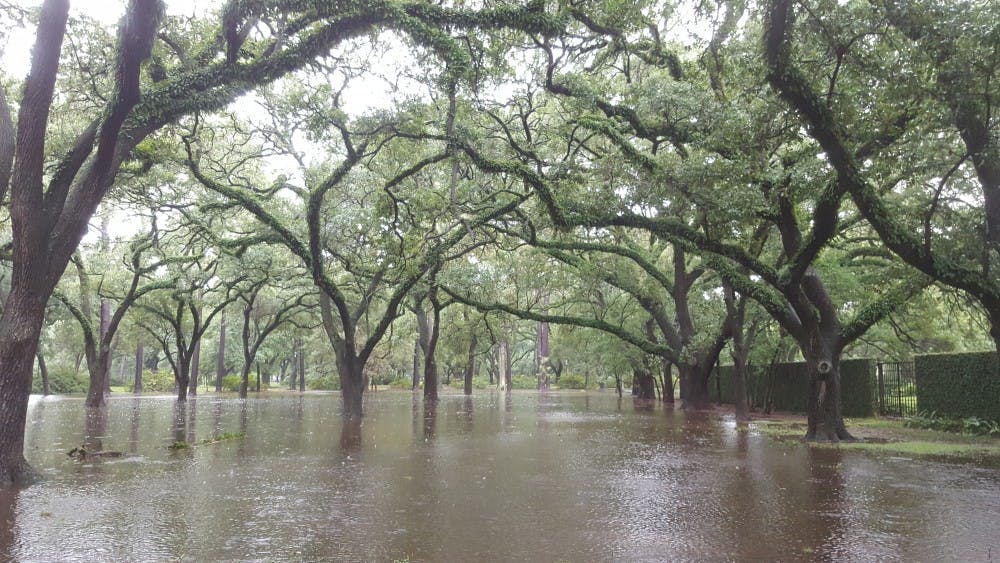Professors make changes in wake of storm

Classes resumed Tuesday after a week of cancellations, leaving professors to decide how to alter lesson plans.
Provost Marie Lynn Miranda sent an email asking faculty with available time to engage students during the period of canceled classes.
“For those of you who have some capacity to interact with students during these two days of canceled classes, I write to solicit your help,” Miranda said. “Because we are a university and because we want our students to have more to do than beer-pong, we would like to find some ways for them to stay intellectually engaged with you, their professors.”
In a second email to faculty on Sept. 1, Miranda recommended professors remove a week’s worth of content from courses.
“We do not want to cram makeup classes into evenings and weekends because this will unduly increase the stress on students, including those who suffered losses in the storm,” Miranda said. “In addition, we believe our students will want to stay engaged in Houston – and that this is a good thing.”
English lecturer Amanda Johnson said she prepared online presentations on material for students to watch at their leisure during the days off.
“Generally speaking, when I have to change a syllabus schedule, I try to do so in a way that creates more work for myself and less for my students,” Johnson said. “Those presentations will pretty much get us caught up with where we would be when our normal class schedule resumes.”
According to economics lecturur James DeNicco, professors’ choices on how to proceed, in light of of the cancelled classes, includes sacrificing some course material.
“The trick for professors [will be] finding time to cover the material they think is most important,” DeNicco said. “If they think it is all important they are going to have to sacrifice in some areas.”
Mechanical engineering professor Eleazar Marquez said the time off of classes will not be harmful to students’ learning.
“I encouraged [my students] to get involved with our community and volunteer in helping those in need,” Marquez said. “But once classes begin, I want the students to be operating in full throttle.”
Marquez said that while he did cancel an assignment originally due the week of Aug. 28, his classes will pick up where they left off before the hurricane.
“Engineering is a field of study where we cannot cover topics in a hasty manner [because we study] scenarios that can pose a threat to our society if we don’t consider them diligently,” Marquez said.
DeNicco said students’ challenges might lie in finding a rhythm within their academic semester.
“There is definitely an ebb and flow to each semester,” DeNicco said. “You get used to things being due on certain dates and covering a certain amount of material in a given time to take an exam. This will delay that and put added stress on the students I am sure.”
Alexia Rauen, a Baker College senior, said she recognizes the difficulties students and professors face, particularly for longer classes that meet once a week.
“[However], I think rescheduling a little class is minor compared to what many members of our Rice community have had to deal with due to Harvey,” Rauen said.
Biosciences professor Michael Gustin said he has made changes to his courses by prioritizing certain classes and content.
“Implicit in my adjustment is a plan that does not increase workload to compensate for time lost to Harvey,” Gustin said.
According to Amy Tao, a Lovett College senior, despite hesitancy about how her professors may decide to proceed with workload, she is confident in their choices.
“I trust their judgment and am sure I’ll still get more or less the same academic experience I would’ve received if classes were not cancelled,” Tao said.
DeNicco said he is confident in the Rice community to conquer the challenges brought on by the hurricane.
“It may be difficult for some of the faculty and students to focus as they try to either pick up their own lives or help others pick up their lives,” DeNicco said. “Going through hardships together and helping others in such difficult times tends to have a very cohesive effect on a community. I for one really can’t wait to get back.”
More from The Rice Thresher

O’Rourke rallies students in Academic Quad
Former U.S. Rep. Beto O’Rourke of El Paso, Texas spoke in front of the Sallyport to a sea of sunglasses and “end gun violence” signs April 17. The rally, organized by Rice Young Democrats, took place in the academic quad from noon to 2 p.m.

Uncertainty, fear and isolation loom over international students after visa revocations
With the wave of international student visa revocations across the country, including three students at Rice and two recent graduates, international students have expressed fears that their visas will soon be terminated without warning.

All bike no beer: bikers race remaining heats without spectators
Modified Beer Bike races, dubbed “Bike Bike,” were held at the track April 18 from 5-8 p.m. Results were released by email April 21.

Please note All comments are eligible for publication by The Rice Thresher.